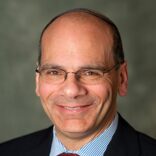Rome — When Pope Francis was first introduced to the world from the balcony of St. Peter’s Basilica, it was immediately obvious that he was a man of great humility who had not expected he would be staying in Vatican City after the papal conclave. The warm, unassuming and unscripted pope described in the media is the same person we met for his first audience with Jewish leaders. Pope Francis, who has an extensive background in Catholic-Jewish relations, put his visitors at ease with his familiarity.
When the former Cardinal Jorge Maria Bergoglio of Buenos Aires was elected as pope, it was groundbreaking for many reasons. He is the first pope from the Southern Hemisphere, first Latino and first Jesuit. But significantly for Catholic-Jewish relations, he is the first pope to experience that interreligious relationship locally and personally in a post-Vatican II way. Francis has a track record of implementing the positively transformed Catholic-Jewish relationship on the ground in a living laboratory with Jewish neighbors and colleagues.
John Paul II, as the youngest bishop, and Benedict XVI, as a theological consultant, both participated in the Second Vatican Council; it was then that the transformative post-Shoah self-reflective 1965 Nostra Aetate document changed the Catholic Church’s relationship with the Jewish people for the better. They used their papacies to codify and exemplify a new era for Catholics and Jews with meticulous guidelines and demonstrative gestures. They were the first popes to visit synagogues and make state visits to Israel.
Francis’ narrative is different. He has lived, flourished, and ascended within the Church as a partner and interlocutor of Jews in a country — Argentina — that is seventh among countries, and a city — Buenos Aires — that is 13th among cities, in terms of Jewish population. In short, he is the first pope to have experience applying Nostra Aetate in real time within a living community.
As archbishop of Buenos Aires, Francis was exemplary in developing relationships with the local Jewish community, reaching out in solidarity in the wake of the 1994 terrorist bombing of AMIA, the Jewish community center, in which 85 were killed and hundreds were wounded. He regularly visited local synagogues and met with rabbis, and established a permanent Holocaust memorial and commemorations at Buenos Aires’ cathedral. His one book, “On Heaven and Earth,” was co-authored with Rabbi Avraham Skorka, a record of their televised dialogue on diverse issues.
Pope Francis’ first audience with Jewish leaders, at the Vatican on Monday, involved leaders of the International Jewish Committee on Interreligious Consultations (IJCIC), an organization that is both a Catholic-Jewish and intra-Jewish achievement. My organization, AJC, is a founding member of IJCIC, the recognized representative of world Jewry in its deliberations with the Vatican. Representatives of IJCIC and the Catholic Church meet formally every two years and informally as needed, to build upon the Nostra Aetate foundation and address differences that arise from time to time among friends. IJCIC is also one of those rare Jewish communal venues where Orthodox, Conservative and Reform rabbinic and lay leaders work together in common cause.
That commonality of interests is firmly grounded in Nostra Aetate, which rejected the deicide charge against the Jews and Jewish accursedness, decried anti-Semitism and affirmed the validity of God’s ongoing covenant with the Jewish people. After the destruction of European Jewry, the United States, where large numbers of Catholics and Jews lived side by side, became the laboratory and leader in advancing Catholic-Jewish relations.
Papal audiences typically are rich in formality, and, by necessity, devoid of significant policy conversations. But, with Pope Francis, there was an atmosphere of honest goodwill, assuring that the Catholic-Jewish relationship will continue to grow closer and stronger.
As we approach 2015, which will be the 50th anniversary of Nostra Aetate, Catholic-Jewish relations can be compared to a beautiful garden, but even a beautiful garden requires sustenance with proper tending and thoughtful new plantings. There will inevitably be disagreements that will be resolved, or at least discussed, among friends, and Pope Francis is a friend. He inherits some rough patches of the recent past, including the consideration of sainthood for Pius XII before the Vatican archives of his record during the Holocaust are fully known. As cardinal, Francis did call for the full opening of the archives, so the truth may be known. The Jewish community will be awaiting the pope’s next move on the archives. The expansion of the Latin Good Friday prayer concerning Jews with new, but still controversial language created by Benedict XVI, will perhaps resurface as a stumbling block in the Francis era.
And the opportunities are vast. A Latino pope has the ability to bring the teachings of Nostra Aetate to the Spanish-speaking world that is less familiar with its content and implications. The Nostra Aetate spirit needs to be brought to the burgeoning populations of Catholicism that have little or no experience with Jews.
In his aforementioned book, Pope Francis writes, “To dialogue, one must know how to lower the defenses, to open the doors of one’s home and to offer warmth.” When we met with Pope Francis, that is what we felt.
Rabbi Noam E. Marans is the American Jewish Committee’s director of Interreligious and Intergroup Relations.
The New York Jewish Week brings you the stories behind the headlines, keeping you connected to Jewish life in New York. Help sustain the reporting you trust by donating today.





